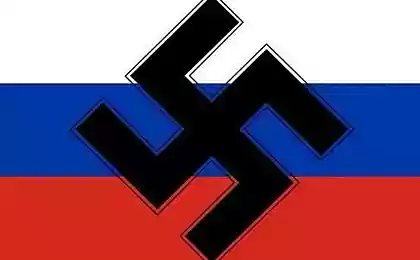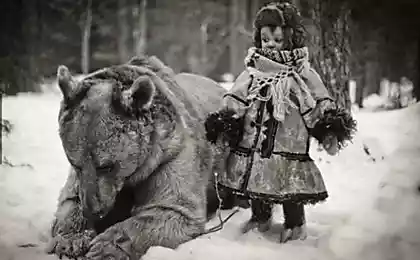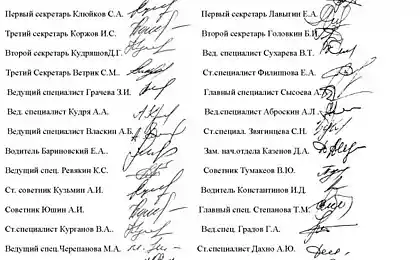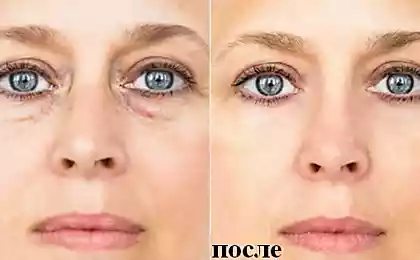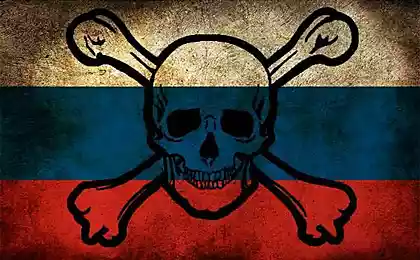891
Through the eyes of the French from Russia
Cut from the book
Alexander Laca, in which he, as a Frenchman who moved to Russia thinks about our country and is often compared with the EU countries, dogonku to this post.
Many interesting letters
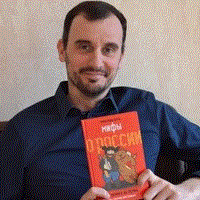
Many see the Russian political system of the country is terribly corrupt, rotten, closed and totally hopeless. They continually described their hatred of the official, who spoke about the desire to either change the system or leave the country. They are discouraged by the behavior of the state apparatus, which is considered not only unacceptable, but also immutable.
"I lose heart" - told me one Russian girlfriend on the reconstruction of sidewalks in downtown Moscow. "I dropped his hands", - she said cruel, illogical and unprofessional behavior of some of his countrymen, which, however, pay for the provision of public services. The mostly young Russian, voicing dissatisfaction with the situation, blame the political system of Russia, while the state saw a such an aggressive predator. One of my friends told me that the Russian fugitive wanted by the authorities, traditionally could be saved in the village - because people will always sympathize with those who are in conflict with the state.
Aggressiveness Russians, who "get" (with a capital D) of the system is aimed at Russian policy. Such feelings are showing some foreigners, considering Russian political authorities are responsible for the fact that he himself is difficult to settle down and work in peace in Russia. Some of them only moved to Russia, start talking about Western Europe as a lost paradise: "And here we have ..." And the Russians and foreigners, who actively criticized the living conditions in Russia, are united by the fact that they believe: "In the West - it is better ».
Candidate of the "creative class" in the elections for president of Russia in 2012. Mikhail Prokhorov called for open borders with the EU and to close - with the countries of Central Asia, thus violating the regional post-Soviet and Eurasian approach, replacing it with the draft accession of Russia to the West, a sort of "West destiny ».
I was raised in French culture, and I know that the "wrong" in France and Western Europe. I appreciate the fact that the state apparatus in France helps citizens much more than in Russia. France has developed a model of society in which the so-called public service until recently worked fine. Only recently begun difficulties in the public sector, and mainly for financial reasons.
I also know that the "wrong" and how things evolve over time. France is very wealthy country in which the rich get richer and the poor get poorer. Unemployment is rising, as in all European countries. The state has a large external debt, but it continues to occupy. Social problems are accumulated, and politicians do not have enough energy to resolve them. But this is not the aspect that fascinates and attracts Russian "creative class" and "criticizing generation." Russian know that France is still considered the birthplace of human rights and that in Western Europe many laws to protect citizens. Critics of the Russian political authorities believe that the best social freedoms are guaranteed in the West than in Russia, and think that the laws on personal freedom make life much more pleasant. But here's the paradox: for me and many other Frenchmen, with whom I have often said, the emigration to Russia was a real breath of fresh air.
The house in which we live - a new one. A pleasant surprise was the fact that we are neighbors settled there almost simultaneously and quickly became friends. On our floor, there is a real social life. Four apartments on the landing took our young people about thirty years old, about the same social level, and this is likely to simplify our communication.
I was very surprised to see what different people - our neighbors. The apartment is on the right lives Eve, she just divorced and ousted her husband, Russian, former military. After ten years of service in the army, he went to work in a private company that sells industrial scales. Other neighbors - Dmitry and Marina. She - Ukrainian, speaks some French; He is Russian. They have a little daughter. And at the end of the corridor Timur lives. He ethnic Caucasian from Maikop, but has always lived in Moscow. My wife Zhenya - karelka; and if not to consider me, it turns a typical post-Soviet community. I have already mentioned that we became fast friends, especially with Eve and Timur, and even put a door to close access to our floor than to create a small common hallway that women call "communal floor».
My neighbors - this is the kind of "creative class." They are young, modern, they have a good job. Almost all of them in the elections voted for Prokhorov. I am friends with Timur (he did not go to vote). The first time we crossed when he called at the door of my apartment - ask for a little bit of oil to cook shrimp. This dark-skinned man did not expect the meeting with the French and immediately invited me to join the company of his fellow Circassians - sit and talk, a snack shrimp. His buddies since I call "Timur and his team." For many gatherings with Timur, flavored with abundant food and good drink watered, I realized that this thing - "Caucasian manner" in which bizarrely mixed generosity and expansiveness. We have discussed and continue to discuss all sorts of topics. Timur, I think, because of their dual status "Caucasian" and Muscovites are now better understand why I do not live in France (although he kept calling me "extremist", once I decided to live in this residential area). I think that many Russians still believe that foreigners are obliged to live in Moscow only in the center, and do not understand why.
We often talk about freedom in Russia and France, that want to live in their own way and according to your desires. Timur, like many Russians, with whom I have discussed these issues, thinks that many laws in Western Europe creates a high level of safety in the community and gives citizens a guarantee of protection and the right to fight against administrative injustice. They usually think that Russian weakness or lack of regulatory framework puts the citizen in a situation where he can not protest against the fact that he does not like, or to deal with problems in society. They think that this kind of lawlessness in the country. So many people say that you need to create a civil society in the European style, in order to improve everyday life in Russia. But this is an illusion.
In France, for example, laws to protect the rights of citizens, unfortunately, led to difficulties in many areas. As in other western countries, there was a "legislative inflation", which has accelerated over several years. There are thousands of laws, decrees and regulations that must be followed, there is a French proverb that says: "All that is not permitted is prohibited". You can not do anything without knowing at first, whether it is allowed to directly and unambiguously. At the beginning of the Civil Code of Napoleon, who still works in France, it says: "No one should ignore the laws." But now there are so many laws that embody the teachings of Napoleon became impossible.
The Labour Code, which must comply with the company is more than 900 pages, not counting the additional agreements by industry activity - it is several thousand pages. Even lawyers specializing in labor law, can not know it all. Code - the legal hell for those who run the business. All possible types of control often hinder the development of the business. In Italy, the laws and regulations even more, but there is a national habit - do not follow all the rules and work, even if it is legal.
In the area of individual freedoms and the protection of the rights of individuals who are interested in many Russians, it was also a legislative inflation, and especially lately. Who minorities are protected better than most. This principle was born in America - is now referred to as "positive discrimination". For example, the entrance exams to universities in a number of American black student can be accepted with 80 points, while white is required to dial 100. The application of these ideas in France contributed to the emergence of certain groups of the population who do not obey the general rules, and live by their own laws. This change in the legal structure of society has destroyed the principles of equality, to which the French were very attached.
In France, robbed gay can use its status of "legally recognized minority" and get a better lawyer than heterosexual. A simple example, rather surprised by Timur. If you are in France poderetsya with someone on the street, you may be a year to imprison. If your victim is able to prove that you have attacked her because you do not like gay people - a legally recognized minority - the court may double the penalty.
In France, the fight against discrimination has grown almost totalitarianism, especially in the field of equal opportunities in the job search. In the same spirit of the American "positive discrimination" political authorities insist that public and private companies are required to hire at least a certain percentage of workers belonging to "visible minorities". This pressure is mainly useful to the French - immigrants from North Africa - and harmful to the rest who do not belong to visible minorities. I mean all European foreigners, the numerical majority in Europe. Create a variety of structures, which are financed by the French state, as well as various private associations living on the different administrative structures of government. They ensure respect for the rights of minorities. For example, help disadvantaged file lawsuits against owners who refuse to lease a member of a visible minority, or against companies that selected employees without new rules.
I clarify: this is not someone's private initiative and public policy. Organizations that receive public subsidies, to identify possible discrimination pressured systematic condemnation.
What if the victim is not a member of any minority? Then he attacked her had served only one year. Let us imagine that in Russia, in the city of Orenburg, the young man was not allowed into a nightclub, and he wrote a statement to the police about their discrimination: they say, he was refused because it is drilled. Will this young man to win the case and convict a nightclub?
Tolerance in France has almost become a dictatorship. If you are an employer and deny the applicant, it can make you prove that you did not take it to work not because of its origin. In this area are the bills that offered a resume without a photograph that the applicant has not proved to be the victim of so-called "discrimination on the face." Also offers to remove from the summary line with the address - because employers tend not to hire applicants from disadvantaged areas and "lawless zones" in the suburbs of Paris.
All of these measures, of course, taken to prevent injustice against minority racial or religious understanding, and initially a good idea. But there is a reverse effect: the majority of white and educated French population feels a loser in comparison with minorities usually of foreign origin. Most native French believe that many new laws and regulations infringes their rights and imposes additional obligations. Minorities are demanding more and more special rights. In France there are, for example, 'Representative Council of Black Associations », CRAN, which deals only with the interests, rights and culture of the peoples of Africa, it is a division along ethnic lines. The equivalent of an association that protects the rights of indigenous French (AGRIF), are regularly subjected to attacks and accusations of racism. What is this if not a double standard?
To combat these communitarian inequalities MEPs adopted additional laws. For example, a law against "wearing of religious symbols", which caused a lot of controversy in France, forbids Jewish students wearing a stack of school, Catholics - to put on too much or too noticeable crosses, and Muslim girls can not wrap up in an Islamic headscarf. Sikh student was expelled from school when he replaced the traditional turban less bulky. His family tried to protest, but the court ruled against him. Another aspect of this "legislative inflation" shows how secularism in France has become a kind of "state religion", which reduces the space and freedom of traditional religions.
Puzzled, Timur asked me that in France, with personal freedom and how things can change in the future in Western Europe.
In France, a number of separate individual rights of certain categories of citizens or communities finally began to contradict each other. These personal rights indirectly affect the rights of the majority (which brings together those who are not a member of the minority), creating a sharp contrast between "individual rights" and "freedom of everyone." All these problems are not in Russia, and I have discussed these issues with Russian as often as it turns out. Yes, for the normal operation of society needs a clear legal framework. Yes, a healthy civil society is extremely important. No, the spread of personal freedom does not only protect people, but also disturbs society (even if unintentionally).
In France, the majority do not trust the minority, but minorities are not assimilated with the majority, creating a closed community, a small state within a state. As elsewhere in Western Europe, far-right nationalist parties have become stronger, and if we are honest, we must say that this issue of public concern. I see in these events a progressive destruction of the state.
Many see the French political system in France is terribly corrupt, rotten, closed and totally hopeless.
We are satisfied with the French judicial system of the country? Do they think that justice is fair? Do they think that their personal rights are guaranteed in the court? Many Russians who think that life is better in the West, naive and full of illusions. French justice has refused royal Arbitration for more than two centuries ago, it is true. There are texts that guarantee the freedom of citizens, but the lack of political power prevents justice to function properly. When the offender is sentenced to less than two years in prison, about 60% of cases it comes free from the court because there is no room in the prisons, they are filled. Offenders say in court that the cause it as soon as available space. The problem is old: power is weak, the judiciary is small, do not build new prisons. The victim often meets her abuser on the street a few days after the court sentenced the offender to prison.
Finally, I think it is very important standard, which aims to society. Not every Russian knows that our political elite in Europe (in France after the departure of General de Gaulle) after the Second World replicate the political, social and moral model of the United States. It seems to me a mistake, because "the American model" was recently established and is based on the territorial ignorance of Aboriginal people - Indians. Up to half of the last century, Western Europe was very homogeneous ethnically, religiously and even socially. Migration to them was largely intra and many countries worked on the model of assimilation: the stranger had to completely abandon his native culture and adopt the values of the country in which he moved to live. When, after World War II, the state attracted non-European immigrants, immigrants from its former colonies, the first wave of economic migrants pushed to the "small" problems of integration. Gradually economic migration became immigration, "escape from poverty," which for several decades has greatly changed the face of Europe. The European Union argues that "times are changing" and that society must now become "multicultural" to digest the mass immigration. This means that all nations should live together in harmony, but each in its own way. Due to the fact that migration flows are not controlled and integration policy in the European states simply do not have, it was closed communities and ghettos in most major Western cities. France, like many countries in Western Europe, should the American model of social development.
Source:
Alexander Laca, in which he, as a Frenchman who moved to Russia thinks about our country and is often compared with the EU countries, dogonku to this post.
Many interesting letters

Many see the Russian political system of the country is terribly corrupt, rotten, closed and totally hopeless. They continually described their hatred of the official, who spoke about the desire to either change the system or leave the country. They are discouraged by the behavior of the state apparatus, which is considered not only unacceptable, but also immutable.
"I lose heart" - told me one Russian girlfriend on the reconstruction of sidewalks in downtown Moscow. "I dropped his hands", - she said cruel, illogical and unprofessional behavior of some of his countrymen, which, however, pay for the provision of public services. The mostly young Russian, voicing dissatisfaction with the situation, blame the political system of Russia, while the state saw a such an aggressive predator. One of my friends told me that the Russian fugitive wanted by the authorities, traditionally could be saved in the village - because people will always sympathize with those who are in conflict with the state.
Aggressiveness Russians, who "get" (with a capital D) of the system is aimed at Russian policy. Such feelings are showing some foreigners, considering Russian political authorities are responsible for the fact that he himself is difficult to settle down and work in peace in Russia. Some of them only moved to Russia, start talking about Western Europe as a lost paradise: "And here we have ..." And the Russians and foreigners, who actively criticized the living conditions in Russia, are united by the fact that they believe: "In the West - it is better ».
Candidate of the "creative class" in the elections for president of Russia in 2012. Mikhail Prokhorov called for open borders with the EU and to close - with the countries of Central Asia, thus violating the regional post-Soviet and Eurasian approach, replacing it with the draft accession of Russia to the West, a sort of "West destiny ».
I was raised in French culture, and I know that the "wrong" in France and Western Europe. I appreciate the fact that the state apparatus in France helps citizens much more than in Russia. France has developed a model of society in which the so-called public service until recently worked fine. Only recently begun difficulties in the public sector, and mainly for financial reasons.
I also know that the "wrong" and how things evolve over time. France is very wealthy country in which the rich get richer and the poor get poorer. Unemployment is rising, as in all European countries. The state has a large external debt, but it continues to occupy. Social problems are accumulated, and politicians do not have enough energy to resolve them. But this is not the aspect that fascinates and attracts Russian "creative class" and "criticizing generation." Russian know that France is still considered the birthplace of human rights and that in Western Europe many laws to protect citizens. Critics of the Russian political authorities believe that the best social freedoms are guaranteed in the West than in Russia, and think that the laws on personal freedom make life much more pleasant. But here's the paradox: for me and many other Frenchmen, with whom I have often said, the emigration to Russia was a real breath of fresh air.
The house in which we live - a new one. A pleasant surprise was the fact that we are neighbors settled there almost simultaneously and quickly became friends. On our floor, there is a real social life. Four apartments on the landing took our young people about thirty years old, about the same social level, and this is likely to simplify our communication.
I was very surprised to see what different people - our neighbors. The apartment is on the right lives Eve, she just divorced and ousted her husband, Russian, former military. After ten years of service in the army, he went to work in a private company that sells industrial scales. Other neighbors - Dmitry and Marina. She - Ukrainian, speaks some French; He is Russian. They have a little daughter. And at the end of the corridor Timur lives. He ethnic Caucasian from Maikop, but has always lived in Moscow. My wife Zhenya - karelka; and if not to consider me, it turns a typical post-Soviet community. I have already mentioned that we became fast friends, especially with Eve and Timur, and even put a door to close access to our floor than to create a small common hallway that women call "communal floor».
My neighbors - this is the kind of "creative class." They are young, modern, they have a good job. Almost all of them in the elections voted for Prokhorov. I am friends with Timur (he did not go to vote). The first time we crossed when he called at the door of my apartment - ask for a little bit of oil to cook shrimp. This dark-skinned man did not expect the meeting with the French and immediately invited me to join the company of his fellow Circassians - sit and talk, a snack shrimp. His buddies since I call "Timur and his team." For many gatherings with Timur, flavored with abundant food and good drink watered, I realized that this thing - "Caucasian manner" in which bizarrely mixed generosity and expansiveness. We have discussed and continue to discuss all sorts of topics. Timur, I think, because of their dual status "Caucasian" and Muscovites are now better understand why I do not live in France (although he kept calling me "extremist", once I decided to live in this residential area). I think that many Russians still believe that foreigners are obliged to live in Moscow only in the center, and do not understand why.
We often talk about freedom in Russia and France, that want to live in their own way and according to your desires. Timur, like many Russians, with whom I have discussed these issues, thinks that many laws in Western Europe creates a high level of safety in the community and gives citizens a guarantee of protection and the right to fight against administrative injustice. They usually think that Russian weakness or lack of regulatory framework puts the citizen in a situation where he can not protest against the fact that he does not like, or to deal with problems in society. They think that this kind of lawlessness in the country. So many people say that you need to create a civil society in the European style, in order to improve everyday life in Russia. But this is an illusion.
In France, for example, laws to protect the rights of citizens, unfortunately, led to difficulties in many areas. As in other western countries, there was a "legislative inflation", which has accelerated over several years. There are thousands of laws, decrees and regulations that must be followed, there is a French proverb that says: "All that is not permitted is prohibited". You can not do anything without knowing at first, whether it is allowed to directly and unambiguously. At the beginning of the Civil Code of Napoleon, who still works in France, it says: "No one should ignore the laws." But now there are so many laws that embody the teachings of Napoleon became impossible.
The Labour Code, which must comply with the company is more than 900 pages, not counting the additional agreements by industry activity - it is several thousand pages. Even lawyers specializing in labor law, can not know it all. Code - the legal hell for those who run the business. All possible types of control often hinder the development of the business. In Italy, the laws and regulations even more, but there is a national habit - do not follow all the rules and work, even if it is legal.
In the area of individual freedoms and the protection of the rights of individuals who are interested in many Russians, it was also a legislative inflation, and especially lately. Who minorities are protected better than most. This principle was born in America - is now referred to as "positive discrimination". For example, the entrance exams to universities in a number of American black student can be accepted with 80 points, while white is required to dial 100. The application of these ideas in France contributed to the emergence of certain groups of the population who do not obey the general rules, and live by their own laws. This change in the legal structure of society has destroyed the principles of equality, to which the French were very attached.
In France, robbed gay can use its status of "legally recognized minority" and get a better lawyer than heterosexual. A simple example, rather surprised by Timur. If you are in France poderetsya with someone on the street, you may be a year to imprison. If your victim is able to prove that you have attacked her because you do not like gay people - a legally recognized minority - the court may double the penalty.
In France, the fight against discrimination has grown almost totalitarianism, especially in the field of equal opportunities in the job search. In the same spirit of the American "positive discrimination" political authorities insist that public and private companies are required to hire at least a certain percentage of workers belonging to "visible minorities". This pressure is mainly useful to the French - immigrants from North Africa - and harmful to the rest who do not belong to visible minorities. I mean all European foreigners, the numerical majority in Europe. Create a variety of structures, which are financed by the French state, as well as various private associations living on the different administrative structures of government. They ensure respect for the rights of minorities. For example, help disadvantaged file lawsuits against owners who refuse to lease a member of a visible minority, or against companies that selected employees without new rules.
I clarify: this is not someone's private initiative and public policy. Organizations that receive public subsidies, to identify possible discrimination pressured systematic condemnation.
What if the victim is not a member of any minority? Then he attacked her had served only one year. Let us imagine that in Russia, in the city of Orenburg, the young man was not allowed into a nightclub, and he wrote a statement to the police about their discrimination: they say, he was refused because it is drilled. Will this young man to win the case and convict a nightclub?
Tolerance in France has almost become a dictatorship. If you are an employer and deny the applicant, it can make you prove that you did not take it to work not because of its origin. In this area are the bills that offered a resume without a photograph that the applicant has not proved to be the victim of so-called "discrimination on the face." Also offers to remove from the summary line with the address - because employers tend not to hire applicants from disadvantaged areas and "lawless zones" in the suburbs of Paris.
All of these measures, of course, taken to prevent injustice against minority racial or religious understanding, and initially a good idea. But there is a reverse effect: the majority of white and educated French population feels a loser in comparison with minorities usually of foreign origin. Most native French believe that many new laws and regulations infringes their rights and imposes additional obligations. Minorities are demanding more and more special rights. In France there are, for example, 'Representative Council of Black Associations », CRAN, which deals only with the interests, rights and culture of the peoples of Africa, it is a division along ethnic lines. The equivalent of an association that protects the rights of indigenous French (AGRIF), are regularly subjected to attacks and accusations of racism. What is this if not a double standard?
To combat these communitarian inequalities MEPs adopted additional laws. For example, a law against "wearing of religious symbols", which caused a lot of controversy in France, forbids Jewish students wearing a stack of school, Catholics - to put on too much or too noticeable crosses, and Muslim girls can not wrap up in an Islamic headscarf. Sikh student was expelled from school when he replaced the traditional turban less bulky. His family tried to protest, but the court ruled against him. Another aspect of this "legislative inflation" shows how secularism in France has become a kind of "state religion", which reduces the space and freedom of traditional religions.
Puzzled, Timur asked me that in France, with personal freedom and how things can change in the future in Western Europe.
In France, a number of separate individual rights of certain categories of citizens or communities finally began to contradict each other. These personal rights indirectly affect the rights of the majority (which brings together those who are not a member of the minority), creating a sharp contrast between "individual rights" and "freedom of everyone." All these problems are not in Russia, and I have discussed these issues with Russian as often as it turns out. Yes, for the normal operation of society needs a clear legal framework. Yes, a healthy civil society is extremely important. No, the spread of personal freedom does not only protect people, but also disturbs society (even if unintentionally).
In France, the majority do not trust the minority, but minorities are not assimilated with the majority, creating a closed community, a small state within a state. As elsewhere in Western Europe, far-right nationalist parties have become stronger, and if we are honest, we must say that this issue of public concern. I see in these events a progressive destruction of the state.
Many see the French political system in France is terribly corrupt, rotten, closed and totally hopeless.
We are satisfied with the French judicial system of the country? Do they think that justice is fair? Do they think that their personal rights are guaranteed in the court? Many Russians who think that life is better in the West, naive and full of illusions. French justice has refused royal Arbitration for more than two centuries ago, it is true. There are texts that guarantee the freedom of citizens, but the lack of political power prevents justice to function properly. When the offender is sentenced to less than two years in prison, about 60% of cases it comes free from the court because there is no room in the prisons, they are filled. Offenders say in court that the cause it as soon as available space. The problem is old: power is weak, the judiciary is small, do not build new prisons. The victim often meets her abuser on the street a few days after the court sentenced the offender to prison.
Finally, I think it is very important standard, which aims to society. Not every Russian knows that our political elite in Europe (in France after the departure of General de Gaulle) after the Second World replicate the political, social and moral model of the United States. It seems to me a mistake, because "the American model" was recently established and is based on the territorial ignorance of Aboriginal people - Indians. Up to half of the last century, Western Europe was very homogeneous ethnically, religiously and even socially. Migration to them was largely intra and many countries worked on the model of assimilation: the stranger had to completely abandon his native culture and adopt the values of the country in which he moved to live. When, after World War II, the state attracted non-European immigrants, immigrants from its former colonies, the first wave of economic migrants pushed to the "small" problems of integration. Gradually economic migration became immigration, "escape from poverty," which for several decades has greatly changed the face of Europe. The European Union argues that "times are changing" and that society must now become "multicultural" to digest the mass immigration. This means that all nations should live together in harmony, but each in its own way. Due to the fact that migration flows are not controlled and integration policy in the European states simply do not have, it was closed communities and ghettos in most major Western cities. France, like many countries in Western Europe, should the American model of social development.
Source:







